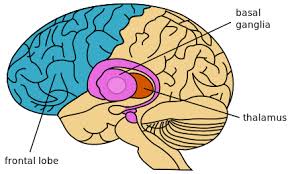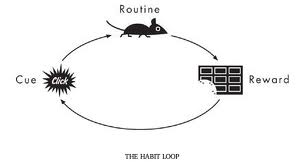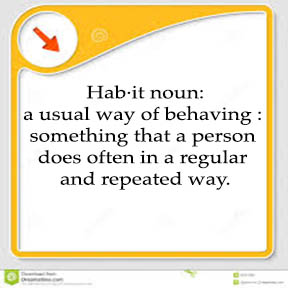
A habit is something you can do without thinking – which is why most of us have so many of them. ~the Quote Garden by Frank A. Clark
Almost 45% of the decisions we make each day are determined by past actions (Habits, Not Cravings). For example, I start each day drinking a cup of coffee, eating a buttered roll and answering emails that then motivates me to get ready for the day. For the next several hours I write. I’ve carried out this routine enough, so that it’s become my habit.
All of us have routine behaviors that take us through the day until we turn in for the night. It seems like we are making decisions, but at least half of the day, we are acting out of habit.
There’s nothing wrong with habitual behavior. Actually, habits are quite useful to us. They let us streamline activities to conserve mental energy for solving problems and carrying out tasks that require us to think through our actions.
But, habits also have their downside, as some of us know well. They kick in at the times that we don’t want them, especially the habits that run counter to our goals. We may want to stop overeating, smoking, spending too much money, or acting shy, but our habit to do the opposite somehow gets the best of us, despite our good intentions.
Is it laziness, poor character, or self-deception that makes us lose self-control? Definitely, it is not any of these. It is the relationship between the parts of the brain that deal with habit and willpower that determines how much we can influence our behavior. We have to appreciate this relationship to know the best way to get our habits to work for rather than against us.
The Character of A Habit
A habit is a recurrent pattern of behavior that is acquired through frequent repetition.
- Habits are easy to form: It takes just two months for the brain’s nerve pathways to learn a new habit (Positive Psychology News).
- Once they form, they are resistant to change.
- The only way to end a habit is to instill a new one in its place.
- Habits are unable to consider their effect on our health, happiness or productivity; they have no mind of their own.
- Habits can act without our consent, and
- Habits have no character of their own. They only become good or bad in the context of set goals.
 A habit gets formed in the brain part called the Basal Ganglion: that small, walnut-like pink shape you see in the picture to the left of this text. This brain part is responsible for learning the way we do things. It studies our procedures and groups them into patterns called habits, making no moral judgment as to their effect on our health, happiness, and productivity.
A habit gets formed in the brain part called the Basal Ganglion: that small, walnut-like pink shape you see in the picture to the left of this text. This brain part is responsible for learning the way we do things. It studies our procedures and groups them into patterns called habits, making no moral judgment as to their effect on our health, happiness, and productivity.
These types of judgments are left up to the turquoise area of the picture called the frontal lobes that sit right behind our foreheads. These powerful lobes carry out complex thinking activities that help us to make sense of information, formulate goals, plan a course of action, and direct our behavior toward its completion. They also help us to inhibit emotions and impulses that stand in the way of our goals.
The vitality of the brain’s frontal lobes determine the extent to which we can exercise willpower over our habits. Consider the example of Mary. Every day after work, she stops at the nearest fast-food restaurant for a super-sized hamburger to hold her over until she arrives home for dinner. She’s gained ten pounds since starting this habit and has decided that it has to end. Mary begins each day fully resolved to break her bad habit. But, by day’s end, her habit of eating fast food on her way home from work gets the better of her.
Why can’t she follow through on her goal? Mary and her willpower have checked out of work for the day. She works in customer service and spends the day solving people’s problems. Mary’s physically and mentally drained, by the time she leaves work. Despite her good intentions, she can’t muster up the willpower to drive past her favorite fast food restaurant. All she can do is go on automatic pilot and letting her habits do the flying for her, so to speak.
The frontal lobes (home to our willpower) are highly sophisticated in function but tire, easily. They can only handle so much problem solving and stress without having to take a break. The basal ganglion (home to our habits) is far more resilient than the frontal lobes, which makes sense. Habits don’t require complex thinking activity. All it needs to do is activate routine behavior that has already been learned and stored.
Like Mary, most of us have good intentions when it comes to our health, happiness, and productivity. We know what we should be doing, but find it difficult sometimes to follow through on our goals.
There are two things we can do to make sure we can follow through on our aims and goals.
 1. We have to create a new, positive habit that successfully competes with the old habit that we want to break. Once a habit forms all it needs is a cue from the environment and the promise of a reward for carrying it out to activate it. Let’s consider Mary, once again. She has the habit of eating fast food on her way home from work. The cue for this behavior is leaving work, feeling stress and tired, and fast food signs along the road. The reward for carrying out the habit is feeling satisfied, less tired and re-energized after having eaten.
1. We have to create a new, positive habit that successfully competes with the old habit that we want to break. Once a habit forms all it needs is a cue from the environment and the promise of a reward for carrying it out to activate it. Let’s consider Mary, once again. She has the habit of eating fast food on her way home from work. The cue for this behavior is leaving work, feeling stress and tired, and fast food signs along the road. The reward for carrying out the habit is feeling satisfied, less tired and re-energized after having eaten.
Mary needs more than a wish and hope to turn around her habit. She has to create a new habit that positively competes with the cues and the rewards for the one she wants to stop.
Mary packs up a snack of cheese, nuts and fruit (foods that will revitalize her physically and mentally) that she will eat right before she leaves work. Once full and reenergized, she will be less vulnerable to the cues that stimulate the old habit (fatigue, hunger, stress, and fast food signs). And, in a very short time, she also gets the reward of weight loss and a boost in self-esteem by following through on her goals.
2. Manage stress levels during the day so that your willpower doesn’t check out on you. Keep your frontal lobes in tiptop working order throughout the day by managing stress. Get enough sleep, eat nutrient-rich foods, get enough exercise, and take time out to relax, laugh and enjoy during the day. These activities stabilize the mind and body so that we can stay in control of ourselves. Remember, we resort to old habits when we are feeling stressed, tired or ill. If we keep our minds and bodies in tiptop shape, even high-pressure situations cannot rob us of our willpower (Habits not Cravings Drive Behavior).
Habits are there to help us out. They are neither good nor bad. They are just habits. We don’t have to spend time breaking bad habits. We just have to set into place new ones that support our goals. When it comes to habits, I like to think that we are crowding out the ones that no longer work for us by building up the ones that do.
I hope you liked my post today. Please let me know by selecting the Like icon that immediately follows. You can also Tweet, Google+1 and Pin today’s post to let your friends know about it. Wishing you a lifetime of positive habits. Warmly Deborah.
If you wish to learn more about habits, take a lot at Steven Guise’s book called Mini Habits, Bigger Results at Amazon.







This is an article I will read over and over! A lot of good information! Thank you Dr Deborah
Thank you Amy. Wishing you well and hoping warm weather comes your way. Love Deb.
i love u dr saab
Thank you very much Bilu. Warm regards to you. Deborah.
It is a very informative article, as always. I liked more the neuroscience part as the abstract traits can only be studied once we know exactly what, how and where something is happening in brain. I would appreciate if it is explained how 45% figure is reached.
Regards.
good
That is wonderful Anwar. Thank you for commenting today. Warmly deborah.
I will try to change my habits as you suggested.
very good post Deborah Khoshaba it’s really helpfulll, thanks
Hello Mathi, thank you so much. I’m glad you like it. Good to say hello today. Warmly Deborah.